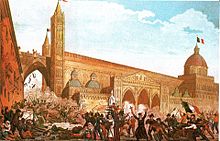Sicilian revolution of 1848
| Sicilian revolution of 1848 | |||||||
|---|---|---|---|---|---|---|---|
| Part of Revolutions of 1848 in the Italian states | |||||||
 The revolution in Palermo (12 January 1848). |
|||||||
|
|||||||
| Belligerents | |||||||
|
Supported by: |
Supported by: |
||||||
| Commanders and leaders | |||||||
|
Ruggero Settimo Vincenzo Fardella di Torrearsa Francesco Crispi |
Ferdinand II of the Two Sicilies Carlo Filangieri |
||||||
| Units involved | |||||||
| Sicilians rebels | Army of the Two Sicilies | ||||||
| Strength | |||||||
| Ca. 20,000 | Unknown | ||||||
| Casualties and losses | |||||||
| Unknown | |||||||
The Sicilian revolution of independence of 1848 occurred in a year replete with revolutions and popular revolts. It commenced on 12 January 1848, and therefore was the very first of the numerous revolutions to occur that year. Three revolutions had previously occurred on the island of Sicily starting from 1800 against Bourbon rule: this final one resulted in an independent state surviving for 16 months. The constitution that survived the 16 months was quite advanced for its time in liberal democratic terms, as was the proposal of an Italian confederation of states. It was in effect a curtain raiser to the end of the Bourbon kingdom of the Two Sicilies which was started by Giuseppe Garibaldi's Expedition of the Thousand in 1860 and culminated with the Siege of Gaeta of 1860-1861.
The former kingdoms of Naples and Sicily were formally reunited following the 1815 Congress of Vienna to become the Bourbon kingdom of the Two Sicilies. Both kingdoms had previously comprised the single Kingdom of Sicily (created by the Normans in the 11th century) during the 12th and 13th centuries, and were split in two following the revolt of the Sicilian Vespers in 1282.
The seeds of the revolution of 1848 were sown prior to the Congress of Vienna, in 1814. This was during the tumultuous Napoleonic period when the Bourbon court was forced to escape from Naples and set up its royal court in Palermo with the assistance of the English navy. The Sicilian nobles were able to take the opportunity to force on the Bourbons a new constitution for Sicily that was based on the Westminster system of parliamentary government, and was in fact quite a liberal constitution for the time. However, post Congress of Vienna, Ferdinand IV of Naples (and III of Sicily) immediately abolished the constitution upon returning the royal court to Naples.
...
Wikipedia
